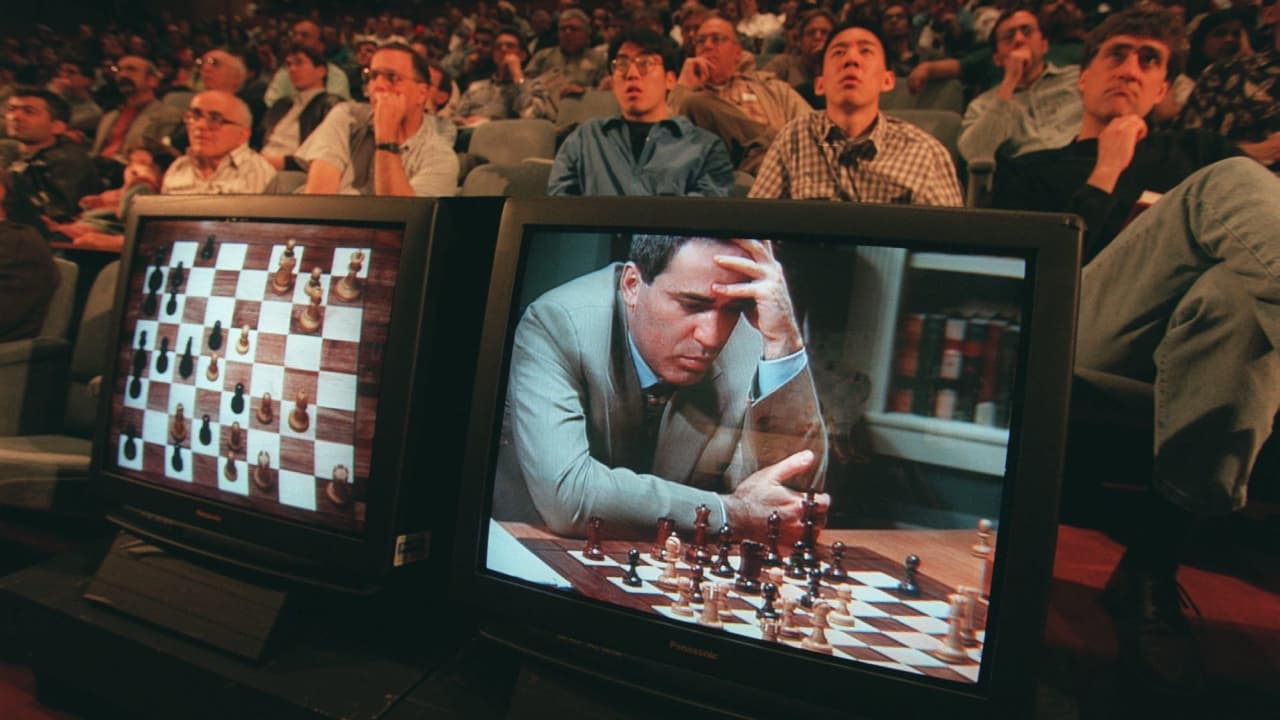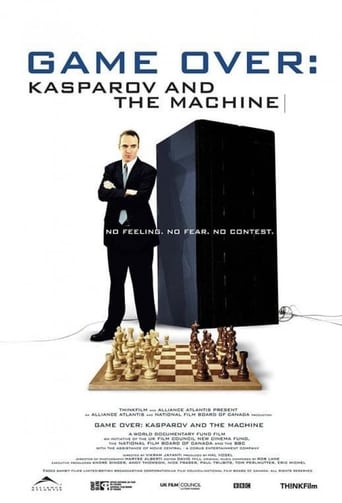


Wonderful character development!
... View MoreVery well executed
... View MoreFun premise, good actors, bad writing. This film seemed to have potential at the beginning but it quickly devolves into a trite action film. Ultimately it's very boring.
... View MoreI am only giving this movie a 1 for the great cast, though I can't imagine what any of them were thinking. This movie was horrible
... View MoreAs chess documentary go, this one is pretty good, even if far from being unbiased. Rather, it is biased both ways, trying to show both sides of the story, but throwing in enough innuendo to make it all seem either a terrible corporate conspiracy or an obstinate refusal to accept defeat from Garry Kasparov. Riddled with scenes from the 1927 film "Le joueur d'échecs", about The Turk, the wondrous mechanical chess player that turned out to be human operated, it doesn't take much to know which direction the film leaned towards.But if you ignore the dramatization, the film is quite filled with interesting information. It is great to see Kasparov explain how the computer strategy is different from a human player's and how the exponential nature of the calculations don't render themselves well to following a long term plan.What I didn't like is that it is not so much about chess itself. The games are not shown, no moves, no knowledge of the game is required in order to watch it. But, as documentaries go, this one was above average and I have to recognize it as such.
... View MoreThis documentary was neither professionally nor objectively made. The whole thing played out like a conspiracy theory by IBM to win the match in question just to make some money. Garry Kasparov has an ego problem. He was puffed up before the match and when he lost, he didn't like it. I remember playing chess against computers back in the 80s and it wasn't too difficult to win. As time went on, I started to lose and didn't like it. Today, I simply don't play against computers anymore because they're just too good. Not only that, the games are uninteresting and lack the appeal of human games, where both sides are more likely to err and open the game to exciting possibilities. This documentary keeps showing us images of The Turk which is an ancient chess playing automaton that was really controlled by a human being. From the start until the end we are lead to believe that IBM short of literally hid a human GM in the back of their cupboard-sized computer. I'm a computer scientist and take offense at the notion that just because Garry lost, IBM must have cheated. I know how computers play chess. It's not magic and it's no mystery. They can be trained, have huge amounts of chess knowledge and they most certainly see positions and possibilities in unprecedented detail compared to humans. It's really no surprise that Deep Blue won. Perhaps at the time it was. If it happened today, given the ever-increasing processing power of machines; people would hardly blink. If a machine couldn't at least draw with a GM today, people would think the program was weak.
... View MoreI'm writing this note as a chess player as well as as a movie viewer. I watched the 1997 Kasparov-Deep Blue games on the Internet. I know something about the issues that were raised. Other chess players will come along and want to know whether this movie is worth seeing/buying, and I'm talking largely to them. However, I'll try not to ignore those who aren't "into chess".This movie is about the 1997 match between Garry Kasparov and the custom-built computer "Deep Blue". However, the first image you see in the movie is not of Kasparov, or of the computer, but of "THE TURK". This is an "automaton" which was built in Europe at the turn of the 18th-19th century and played winning chess against all comers. I put the word "automaton" in quotes because it was, as everyone now knows, a fake. There was a man inside it.If you don't like seeing "THE TURK", then you won't be able to stand the movie, because "THE TURK" has as much screen time as Kasparov, maybe more, both in modern footage and in b/w footage from some old movie. The reappearance of "THE TURK" every few seconds underscores Kasparov's charge that "Deep Blue" had human assistance - that it was (to some degree) a fake computer, that IBM cheated, that there was "a man inside it" working behind the scenes to help it win. Not only does Kasparov believe this, but the filmmakers seem to believe it too. And so this is not really much of a movie about chess games or about programming chess computers. It is a propaganda piece about a big corporation supposedly misusing a helpless grandmaster. Really it is a lot like a "negative campaign ad", as it is chock full of ominous music and evocative camera work and spooky sound effects and innuendos ("we never found out what was behind that locked door") and the ever-present "TURK".Now, most people in the chess community are pretty much convinced that IBM did not cheat and that this was Garry's paranoia at work. To start with, in order for a human to help "Deep Blue" beat Kasparov, it would seem that you would need a human who was better than "Deep Blue" AND better than Kasparov. Since there was no such person, the whole idea is a bit suspect from the start. Furthermore, by the time this movie was made, there were computer programs that could run on your PC that could beat strong grandmasters. Today, much more than in 1997, we take it for granted that a computer can do things you might not expect. And we are less likely to take it as a monumental human tragedy that a computer beat a guy in chess. (And in fact, the bottom line is that Kasparov beat himself with two bad mistakes, including resigning game 2 in a drawn position.) As for the chess games, you actually see very little of them. There are a few comments from masters and commentators that tell briefly how they went, but really you don't get to see hardly any of the strategy or tactics at all. Naturally as a chess player I take this as a major shortcoming, but I think that non-players are being cheated too. Imagine a baseball movie, for example, where you don't hardly get to see any of the game - just a commentator telling you that "in Game Four, the White Sox defeated the Astros with such and such a score." Nobody would make a movie like that. But here, for example, we are told that Kasparov made a bad blunder in the opening of the decisive game 6, but we aren't shown the position on the screen, or told why it was a blunder, or what he should have done instead, or anything. We just see a few seconds of Kasparov holding his head in his hands, and then more atmospheric sound effects and camera work.(Since I saw this on DVD, let me warn chess players about the DVD as well. The jacket promises you that the Extras include the games "with analysis". Is this grandmaster analysis, which people like us might find interesting? NO! It is the automated computer voice synthesizer analysis from some version of Chessmaster, that tells you when a piece is attacked and a pawn gets isolated and that you are in the "Caro-Kann Defense, Main Line". Blahhhh.) Someone might then come along and say, "Well, clearly this movie is meant to dramatize the match for the non-player, and so it's unfair to be impatient with it." But actually it doesn't do a very good job of reaching out to the non-player either - it skates over some points that a true novice would really want to have explained. For example it says that Kasparov could have gotten "perpetual check" in the second game, but it doesn't explain what that is (or show what it would have looked like on the board, which would have been interesting). It flashes back to the Kasparov-Karpov matches but doesn't explain why there were two of them or who organized them etc. I didn't need this information myself, but I'm familiar with it. If you don't already have chess experience, there are places where you are going to be confused, and this is just a defect in the film.Ultimately I can't recommend the movie, which, like "THE TURK" itself, is not what it purports to be (a documentary) but more of a stage illusion.
... View MoreGame Over chronicles the infamous chess rematch between world champion Gary Kasparov and Deep Blue, an IBM supercomputer specially designed for the game that took over 30 man-years to create. The film itself is a mere 85 minutes and wastes no time making its assault on IBM, starting off with a damning reference to "The Turk," a famous hoax which purported to be a chess automaton. Roughly half of the film continues this bare-knuckle attack, with the director using creepy fade shots interspersed with interviews with IBM employees and an annoying whisper voice commentary to clearly inform the audience of who the "bad guys" are. This blatant taking of sides from early on is somewhat distracting to the viewer, as the facts presented later seem questionable due to the overwhelming bias of the filmmaker. For example, the film notably does not mention one of the programmer's attempts to stage another rematch between Kasparov and Deep Blue. Seeing as one of the primary arguments used to discredit Deep Blue's win is the refusal of a rematch on IBM's part, it seems outright irresponsible to ignore this important fact completely.The other, and much better, half of the film is the story of Gary Kasprov and the trials and tribulations he faced during his match against Deep Blue in 1997. The film shows a side of Kasparov many may be unfamiliar with. While the mainstream media at the time seemed bent on selling him as an arrogant, flustered, and tactless mad scientist of sorts, Kasparov proves the contrary with his charisma and wit. He acts as a kind of tour guide throughout the film, taking the viewer everywhere from the headquarters of the Soviet chess program to the site of the match in New York. Not surprisingly, most viewers will find themselves rooting for a considerably humanized Kasparov and feeling the sting of defeat as the overwhelming pressure of the press, the matches and the future of chess all wreak havoc on his concentration.Unfortunately for chess buffs, the film itself pays little attention to the actual match itself. It gives a brief description of how each side did in each game and briefly points out the move Kasparov thought was too "uncomputer-like" to have been made by a machine. The DVD, however, does have a fairly detailed reenactment of the matches done in Chessmaster, complete with commentary. The unbalanced and frankly boring and repetitive slam on IBM earns a 3, but the compelling story of Gary Kasparov earns a 9, making this film a 6 over all. If you are interested in the subject, it's worth the rent but the attack on IBM seems too vicious considering the hazy circumstances.
... View More